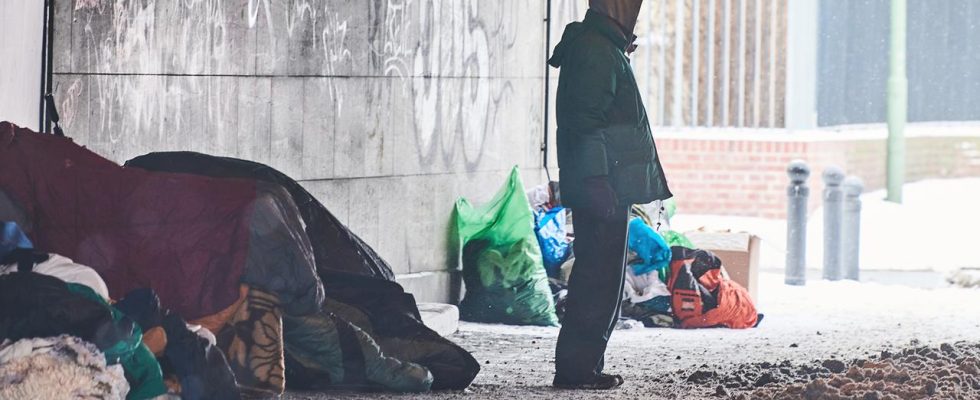Many homeless people suffer from psychiatric illnesses. They often cannot find help. The consequences are dramatic.
The windows are decorated for Christmas, fir branches, straw stars, fairy lights. There are homemade cookies on the table in the common room. Patrick lives here – still. The 21-year-old has to move out of the youth residential group in Würzburg today. He is aware of the consequences: “If we don’t find anything, I’ll be homeless.”
Despite the facility’s best efforts, no residential group for adults could be found that would accept Patrick. He needs special intensive care, since Patrick has a mental disability and cannot control his anger – in technical terms one of the Axis 1 disorders. He repeatedly freaks out, demolishes the facility and has even become violent towards the teachers. His mother fought for her son for 20 years, but now had to give up legal guardianship for health reasons.
The proportion of mentally ill people is particularly high
It is not uncommon for people with psychiatric illnesses to end up on the streets: The Würzburg social department states that that around 70 percent of the homeless in the city are at least psychologically abnormal. Several current studies confirm this.
The medical director of the psychiatric clinic in Lohr, Dominikus Bönsch, explains why the proportion is so large: “The more complicated a person is, the more problems they have, the more difficult it is to provide the right care.” The result: People like Patrick don’t get the help they need. “They ultimately end up homeless.”
A Germany-wide problem says Bönsch. The consequences are dramatic, because people like Patrick initially end up in homeless assistance. A place that is essentially nothing more than a catch basin for accommodation and first aid. She is not responsible for caring for mentally ill, homeless people.
Legal gap makes it difficult to provide tailor-made help
There is a legal gap: In terms of regulatory law, the municipality has to take care of the people who end up on the streets – but all further help falls under social law. This includes integration assistance, which offers support with housing, leisure time and special education services.
The federal states determine which authority is responsible for integration assistance services – and this is located in different bodies. It’s a patchwork quilt.
“We are being forced to jump into this gap,” says Michael Thiergärtner from the homeless assistance agency in Würzburg. “Of course it is difficult when people come here with a diagnosis. We are not equipped with psychiatric professionals.”
homelessness as a one-way street?
Is there a way out of homelessness? Yes, says Thiergärtner – projects like “Housing First” are a first step. That means: a roof over your head. Patrick doesn’t want much more either.
A few weeks ago he was in a facility for a trial period – then he was rejected, partly because of his sometimes aggressive behavior. Not good prospects. The waiting lists for assisted living groups are long – but at the same time the need is apparently unknown.
The federal government does not have its own figures on the housing situation
Upon request, the Ministry of Social Affairs and Building will refer you to the Federal Government’s Ministry of Health. From there it is again said that “housing policy plays an important role as a public service in close connection with health and social policy”. The questions about the need were not answered.
The request in Bavaria paints the same picture: The Bavarian Ministry of Social Affairs explains that they do not know how many mentally ill people in Bavaria need a place in a supervised residential home. The ministry refers to the districts. But the Bavarian District Council cannot provide any figures either – and therefore ultimately does not know what the need is.
A system error that can have catastrophic consequences for Patrick. According to the Federal Participation Act, he has a right to appropriate care and a home. The threat of homelessness scares him very much: “I feel restless. I have such a restless feeling inside of me.”
Help system in Germany too high a threshold
The Federal Working Group for Homeless Assistance has recognized the problem. One solution could be to continuously provide medical assistance to give homeless people low-threshold access to medical care.
Currently, access to the help system is too high, criticizes Werena Rosenke, managing director of the working group. It is already difficult to get therapy places. In addition, appointments must be kept binding. According to Rosenke, this is very difficult for people without a permanent address – especially without adequate social-educational and psychological support. Especially for people with cognitive impairments like Patrick.
Judgmental order: Psychiatric clinic
A final option is admission to a clinic. The Würzburg District Court approved it for Patrick at short notice. Medical director Bönsch knows that there is no real perspective: “The task of a psychiatric hospital is acute treatment.” Once this is completed, there will be no more money from the health insurance company. The same applies if the reasons for endangering yourself or others no longer exist. “In all cases, accommodation with us comes to a quick, natural end and is not unlimited.”
So an interim solution. Patrick has been through a lot of these. He finally just wants a real home.

